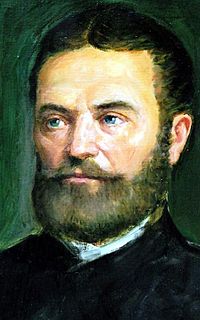János Bolyai
| János Bolyai | |
|---|---|

Portrait of J. Bolyai by Ferenc Márkos (2012)
|
|
| Born |
15 December 1802 Kolozsvár (Klausenburg), Transylvania, Habsburg Empire (now Cluj-Napoca, Romania) |
| Died | 27 January 1860 (aged 57) Marosvásárhely, Transylvania, Austrian Empire (now Târgu Mureş, Romania) |
| Residence | Habsburg Empire, Austrian Empire |
| Nationality | Hungarian |
| Fields | Mathematics |
| Alma mater | TherMilAk (diploma, 1822) |
| Academic advisors | Farkas Bolyai |
| Known for | Non-Euclidean geometry |
János Bolyai (Hungarian: [ˈjaːnoʃ ˈboːjɒi]; 15 December 1802 – 27 January 1860) or Johann Bolyai, was a Hungarian mathematician, one of the founders of non-Euclidean geometry — a geometry that differs from Euclidean geometry in its definition of parallel lines. The discovery of a consistent alternative geometry that might correspond to the structure of the universe helped to free mathematicians to study abstract concepts irrespective of any possible connection with the physical world.
Bolyai was born in the Transylvanian town of Kolozsvár (Klausenburg), then part of Hungary in the Habsburg Empire (now Cluj-Napoca in Romania), the son of Zsuzsanna Benkő and the well-known mathematician Farkas Bolyai.
By the age of 13, he had mastered calculus and other forms of analytical mechanics, receiving instruction from his father. He studied at the Imperial and Royal Military Academy (TherMilAk) in Vienna from 1818 to 1822.
He became so obsessed with Euclid's parallel postulate that his father wrote to him: "For God's sake, I beseech you, give it up. Fear it no less than sensual passions because it too may take all your time and deprive you of your health, peace of mind and happiness in life". János, however, persisted in his quest and eventually came to the conclusion that the postulate is independent of the other axioms of geometry and that different consistent geometries can be constructed on its negation.
He wrote to his father: "I created a new, different world out of nothing."
...
Wikipedia
